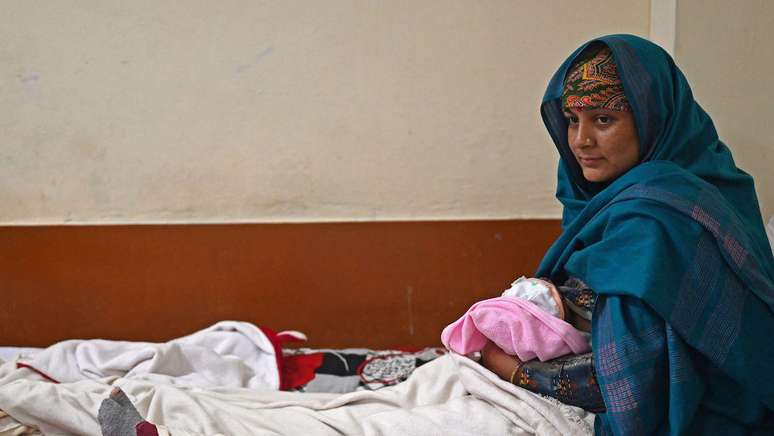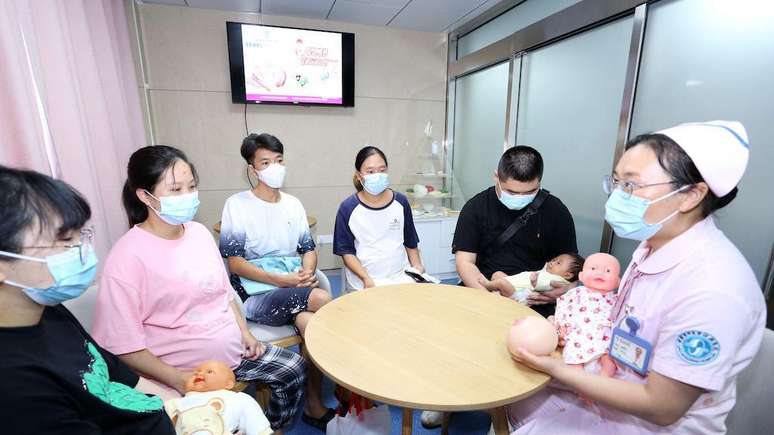A United Nations campaign to encourage mothers to breastfeed takes place every year during the first week of August
html[data-range=”xlarge”] figure image img.img-1367ec5d70f1cafbd3e7f02051e118381m1j6kn7 { width: 774px; height: 435px; }HTML[data-range=”large”] figure image img.img-1367ec5d70f1cafbd3e7f02051e118381m1j6kn7 { width: 548px; height: 308px; }HTML[data-range=”small”] figure image img.img-1367ec5d70f1cafbd3e7f02051e118381m1j6kn7, html[data-range=”medium”] figure image img.img-1367ec5d70f1cafbd3e7f02051e118381m1j6kn7 { width: 564px; height: 317px; }HTML[data-range=”small”] .article__image-embed, html[data-range=”medium”] .article__image-embed { width: 564px; margin: auto 0 30px; }
As part of its global breastmilk campaign, the United Nations (UN) has called on public and private companies around the world to allow women to breastfeed their babies in the workplace.
According to the United Nations, babies who are not breastfed are 14 times more likely to die before they are one year old than babies who receive breast milk.
The UN campaign wants mothers to be guaranteed the right to maternity leave, at regular intervals in the working day to breastfeed their children, as well as having an exclusive breastfeeding room at the workplace.
Some myths about breastfeeding still persist, discouraging many mothers from breastfeeding their babies. The report consulted two experts to debunk some of these very common myths.
Catriona Waitt is MD in the Department of Clinical Pharmacology and Global Health at the University of Liverpool and Visiting Research Fellow at Makerere College of Health Sciences, Kampala, Uganda.
Alastair Sutcliffe is a pediatrician at University College London.

Health problems make Virginia Fonseca postpone plans for a third child with Zé Felipe
Myth 1: Breastfeeding is painful and nipples swell during practice
Doctor Waitt: This is a difficult question to address as it is perfectly normal for mums to initially experience some nipple pain until they get used to it. However, breastfeeding itself shouldn’t be painful. If the pain persists, it could be a sign that there is an infection at the site or that the baby is not attaching his mouth to the breast as he should.
It is normal for there to be some discomfort and it may be necessary to adjust the position of mother and baby, especially if it is the first child or the first experience of this type. If the pain is severe and persistent, the problem should be discussed with the pediatrician, nurse or midwife providing support.

Myth 2: You won’t be able to breastfeed if you don’t start breastfeeding now
Dr Sutcliffe: Anything that encourages mothers to breastfeed should be considered good for overall health as it has far-reaching benefits. Any artificial restriction imposed on natural human behavior, such as imposing a strict time limit, has no scientific basis.
But there are certainly several advantages to immediately offering the breast to the baby from the mother.
The biggest of all is obviously the nutritional aspect. Breastfeeding also helps initiate the process of uterine contraction, which can prevent, or at least delay, postpartum uterine bleeding.
In the first days after giving birth, the mother’s body produces colostrum, a substance rich in protein. It is this important substance that initiates the lactic period.

Myth 3: You can’t take medicine if you are breastfeeding
Doctor Waitt: This is one of the top questions asked by moms all over the world. Will the medicines I take affect my baby?
Indeed, the amount of chemical components that reach the child is minimal. If a doctor prescribes a drug, you can and should ask if it will have any impact on your child, but the answer will most likely be that it won’t cause any harm to your son or daughter.
In most cases, what a child needs is a healthy mother. The medicines that are normally given to mothers for infections, pain relief and antidepressants do not cause any harm to the baby.
There are very few medications that shouldn’t be taken while breastfeeding. They are usually associated with specific and more serious treatments, such as for cancer.
Other drugs, on the other hand, should be taken only after a careful assessment of the risks and benefits. Any woman whose doctor has prescribed medication should be able to ask any questions she wishes.
The ones to watch out for are over-the-counter remedies, such as cold and flu remedies that contain decongestants — they can reduce milk production.
And always be careful with medicinal herbs because you never know exactly what they contain and many of them have not been properly researched.

Myth 4: You should eat only staple foods and avoid spicy dishes before breastfeeding
Dr. Waitt: There is nothing you shouldn’t eat while breastfeeding. However, the exact composition of your breast milk is influenced by your diet.
In some cases, a woman may notice a pattern. For example, I noticed with one of my children that if I drank a citrus juice, such as orange juice, the child would become very irritable.
Sometimes you may notice a pattern where your baby reacts to something that can be influenced by your diet. But there is nothing that is supposed to be harmful or medically incorrect that should be avoided.

Myth 5: You should never use formula if you want to breastfeed
Dr. Waitt: This is not absolute. However, much of breast milk production is largely regulated by supply and demand. A woman’s body is incredibly designed to produce enough milk for her baby.
As the baby sucks on the nipple, it activates hormones to produce the right amount of milk. So whether you’re breastfeeding a toddler, a huge baby, or even twins, your body will always produce enough milk.
If you start formulating, this cycle of reciprocity stops. Your body isn’t getting enough signals that your baby needs more. If you are having difficulty with milk production and you start introducing formula, this may provide you with short-term relief, but it may start to make the problem worse.
On the other hand, if you’re having a terrible night, or you’re sick and exhausted and your partner gives the baby formula to help you rest, that doesn’t mean you can’t breastfeed. So basically it’s not something absolute, but it can be useless.

Myth 6: You shouldn’t breastfeed if you’re sick
Dr Sutcliffe: No, this is a myth. The only circumstances where someone wouldn’t breastfeed is if they have HIV or hepatitis. These viruses can be transmitted through breastfeeding, which we have faced tragically in the past.
In most cases, it is safe to continue breastfeeding when mothers are sick, as their bodies make antibodies that also protect the newborn. It is extremely rare to see a disease in a child transmitted from a nursing mother.

Myth 7: It is difficult to wean a baby if you breastfeed for more than a year
Doctor Waitt: The World Health Organization recommends exclusively breastfeeding for six months and then introducing complementary feeding, but continuing to breastfeed for as long as desired. There is no recommended time to stop.
In some high-income countries, such as the UK, most children are fully weaned between the ages of one and two. While in other low-income countries like Uganda, breastfeeding continues until age two or three. A global problem is that many countries do not have sufficient maternity leave to allow mothers to exclusively breastfeed according to WHO recommendations.
Source: Terra
Ben Stock is a lifestyle journalist and author at Gossipify. He writes about topics such as health, wellness, travel, food and home decor. He provides practical advice and inspiration to improve well-being, keeps readers up to date with latest lifestyle news and trends, known for his engaging writing style, in-depth analysis and unique perspectives.






-to4l92e9v7fo.jpg)


